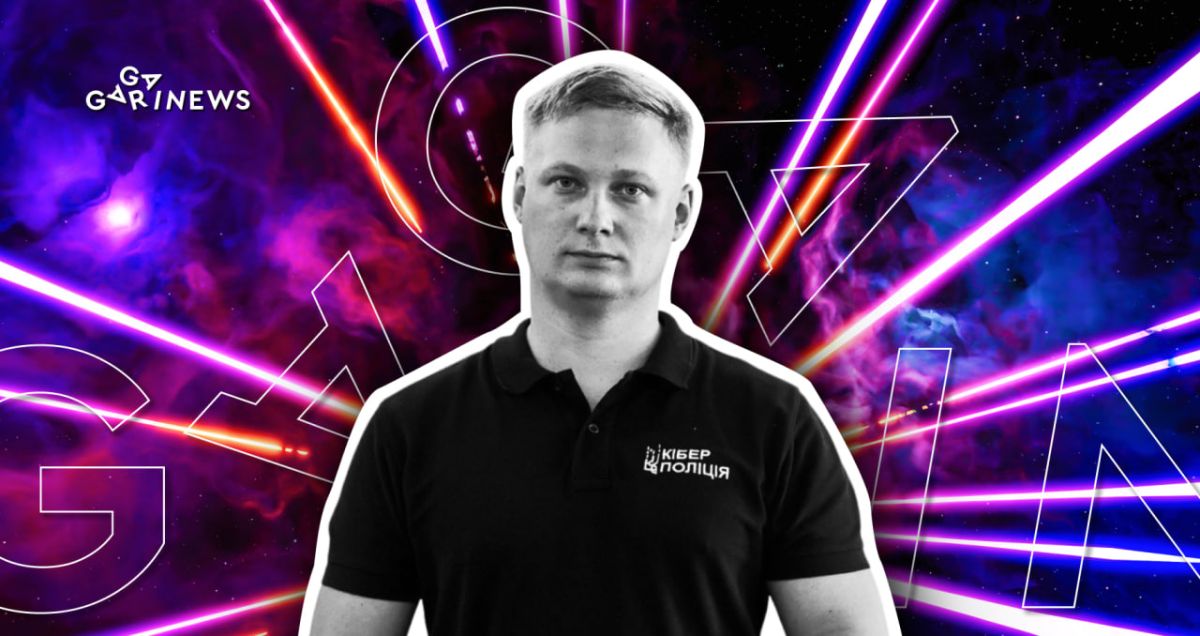Exploring crypto crimes with a real cyber policeman

In an interview with Gagarin News, Ukrainian cyber police officer Yevhenii Panchenko shared how his team is combating crypto-related crimes and preventing russia from utilizing virtual assets for illicit purposes.
On this page
Dossier by GNcrypto
Yevhenii Panchenko
Position: Head of the Cyber Police Department of the National Police of Ukraine
Born: November 15, 1990, Kyiv
Education: A Master of Laws, graduated with honors from the National Academy of Internal Affairs in 2013
Hobby: Outdoor activities in the mountains, listening to electronic music, and analyzing open data, web3, and NFTs
GNcrypto: Last year, the Ukrainian cyber police uncovered over 600 crimes linked to the use of virtual assets. What kind of crimes are they mainly referring to?
Yevhenii Panchenko: About 35% of crypto-related crimes are online scams. Criminals offer, for example, to exchange funds at a profitable rate or to purchase a car with cryptocurrency. The victim pays, but the fraudster disappears, leaving them with nothing.
The next most common type of crime, which accounts for about 14%, is pseudo-investment projects. These are sophisticated schemes where scammers offer to invest money in cryptocurrency on favorable terms. They create a website to promote their investment project, collect as much money as possible, and then vanish. It can be difficult to prosecute these criminals as they may claim they were hoping for the project's success but it didn't work out. They usually argue that it wasn’t their fault and they had no fraudulent intentions.
GNcrypto: Even large exchanges are now talking about these issues…
Yevhenii Panchenko: Yes, that's correct. In the US, for example, owners of crypto exchanges are facing charges for improper company management. If a significant amount of funds is invested in a particular platform, investors rightfully expect to see results. However, many have been left in debt, and their funds have vanished.
Returning to Ukraine, there is another type of crypto crime, which is fraud related to collecting aid supposedly for victims of war. My department tracks and analyzes criminal transactions on behalf of the National Police. We provide comprehensive analytics on virtual assets, and recently, more and more units and bodies of the National Police have been turning to us. The crimes associated with virtual assets range from online theft to brutal murders and kidnappings.
GNcrypto: Ukraine is currently ranked fourth in the world for cryptocurrency fraud. Can you shed some light on why our country is amongst the leaders in this unfortunate category?
Yevhenii Panchenko: Well, it's not surprising that Ukraine has earned this ranking. According to Chainalysis, Ukraine ranked fourth in the world for crypto adoption. So, it stands to reason that a high demand for virtual assets would lead to a corresponding level of crypto crime.
One of the main principles of cryptocurrency, as outlined by Satoshi, is decentralization and security for owners. Since owners are the ones who directly store crypto assets, investigating crimes related to virtual assets is extremely difficult. Unlike traditional theft in a physical store, where the thief can be caught on cameras or by other people, investigating crypto-related crimes requires a large and highly skilled team of analysts who can work with blockchain and cryptocurrencies.
Another challenge is the absence of third-party assistance, which is typically available in traditional financial transactions through banks or payment systems. In the case of crypto transactions, we often need to rely on the cooperation of crypto platforms. Following the authority granted by the court or investigative bodies, we approach these companies for assistance. The absence of such third-party entities can significantly impede the investigation process.
GNcrypto: Can a law-abiding citizen ever have their crypto assets seized? What should they do in such a situation, and where can they get help?
Yevhenii Panchenko: There have been very few cases of this happening in the past three years, especially when you consider the hundreds of crimes that have been investigated during that time. However, if it does happen, it's important not to leave it to chance. The person should provide their explanation and a counter-statement to the law enforcement agencies. All statements will be combined and given a competent evaluation. This may even speed up the closure of the case. If there is already a statement of a crime being committed, the authorities will have the task of finding a suspect. When a citizen reports the incident themselves, both sides of the conflict are immediately present. For example, there may have been a long-standing business relationship between the parties, and everything had been fine until a glitch or problematic situation occurred. In such cases, it may be possible to avoid having it considered in the criminal justice system and instead resolve it through the civil justice system.
GNcrypto: Can you describe the typical profile of someone who uses virtual assets for criminal purposes? What is their gender, age, education, psychological makeup, or habits?
Yevhenii Panchenko: Creating a hypothetical profile of a criminal is called profiling. As a law enforcement officer, it is not my place to make such judgments or draw personal conclusions. However, I can say that cybercriminals are often knowledgeable, educated, and well-informed. They keep up to date with the latest market trends to understand which vectors are currently popular among players and which levers can be used in their fraudulent schemes. Typically, we are dealing with modern, progressive people who keep their finger on the pulse of events.
GNcrypto: We know that the OSCE and UNODC are currently implementing a project in Ukraine aimed at minimizing the risks of money laundering through cryptocurrencies and virtual assets. Can you tell us more about this cooperation?
Yevhenii Panchenko: This question is under the control of the Cyber Police Department's leadership, specifically its Head Yurii Vykhodets, who is personally involved in many international cooperation groups. Our goal is to prevent russia from using virtual assets for criminal purposes by advocating for sanctions that limit access to crypto platforms, such as exchanges and exchangers.
It's important to note that international law has its own complexities. We submit our proposals for sanctions to the relevant EU and US structures with the help of the OSCE and UNODC. These powerful European platforms provide normative and advisory support, helping us systematize our own developments. By doing so, we not only achieve national results in countering the enemy but also reach an international level.
For example, we've recently been monitoring the bilateral relations between Iran and russia, which have led to the creation of unique instruments like stablecoins. We're exploring various stages of sanctions, decisions, and criminal proceedings to prevent sanctioned economies from transitioning into the crypto sphere. Financial sanctions are pushing russia to rely on crypto as the primary way to receive external financial support. We must track this path reliably and take proactive measures to eliminate it.
The content on The Coinomist is for informational purposes only and should not be interpreted as financial advice. While we strive to provide accurate and up-to-date information, we do not guarantee the accuracy, completeness, or reliability of any content. Neither we accept liability for any errors or omissions in the information provided or for any financial losses incurred as a result of relying on this information. Actions based on this content are at your own risk. Always do your own research and consult a professional. See our Terms, Privacy Policy, and Disclaimers for more details.


























